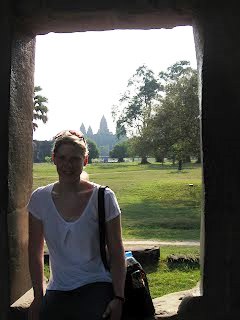This month, we chat with Christina Polyak, MD, MPH, an active member of the Society's Committee on Global Health (ACGH). In addition to her work at WRAIR, she is also a Clinical Instructor in the Department of Allergy and Infectious Diseases with the University of Washington. After completing her fellowship in infectious diseases last year, Dr. Polyak joined MHRP where she is responsible for developing and supervising clinical trials related to HIV and HIV-related co-infections, particularly malaria and TB. Polyak is based in Kenya and has been living there since 2011.
 1) We appreciate that you’ve been a member of ASTMH since 1999. What drives you to be an active member in the workings of the Society?
1) We appreciate that you’ve been a member of ASTMH since 1999. What drives you to be an active member in the workings of the Society?
Becoming a member of ASTMH has helped develop my career through opportunities including, travel awards, fellowships and mentoring. I hope to continue this tradition by helping others who are starting their tropical medicine careers. Also, the ASTMH Committee on Global Health (ACGH) aims to create exciting collaborative opportunities between ASTMH members and those interested in learning more about global health. I enjoy the collaborative spirit of the ASTMH team and welcome the occasion to be involved as we chart a path forward.
2) You were active in the Society’s efforts to add career development features to the 2012 Annual Meeting. What more can the Society do to help people who are early in their tropical medicine careers?
ASTMH should continue to support training and education with travel grants and fellowships. Annual Meeting registration fees should remain reasonable for trainees so they can attend and link with experts. Specifically, the ACGH will continue to hold symposiums at the Annual Meeting dedicated to education and career development for those interested. This year, the ACGH has a speed-networking event planned – stayed tuned for more details.
3) Based on your own experiences, what three pieces of advice would you give young researchers hoping to take a similar career path?
First, get into the field. If at all possible, spend time in different professional environments and make a point of understanding the challenges involved with working in less well-resourced settings. Second, diversify. My heart was set on malaria research; now my research focuses on HIV and co-infections, such as malaria. The experience itself means a lot and sometimes you have to be willing to work outside your scope to get the skills and mentorship you need to get started. Finally, be proactive and seek out opportunities instead of waiting for them to come to you. If you want to meet someone and are interested in their work, email them and introduce yourself. Take an active approach in your own development since ultimately, your career is your own responsibility.
4) Society members place a high value on making connections at the Annual Meeting. Due to the growth in meeting attendance, it is challenging to attend the best sessions, meet with colleagues and find time to foster those vital new connections over an already busy few days. What can the Society do to help attendees make new and possibly lasting relationships?
The Annual Meeting is a whirlwind for sure -- but a fun one. Encouraging interaction at sessions and social events within the meeting can result in a less intimidating environment. The opening night reception is always a success and allows everyone time to see colleagues, meet new people and mingle amongst exhibits.
5) The field of tropical medicine draws from a wide range of health, science and community professionals. How can ASTMH continue to ensure this rich diversity is both represented and active in the Society and its volunteer leadership?
ASTMH benefits from teamwork. The Society needs to emphasize the opportunity to be a part of a multi-disciplinary team and meet colleagues from various backgrounds. Engaging early career professionals as well as seasoned experts allows those of us starting our careers to learn from the best.
---
ASTMH members are the best and the brightest in their field. Our member interviews highlight our diverse and growing membership. To read other member profiles, click here.